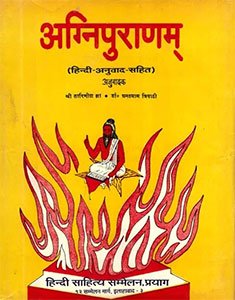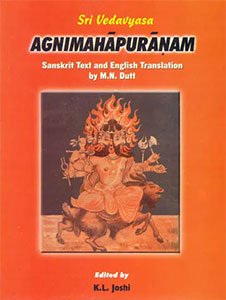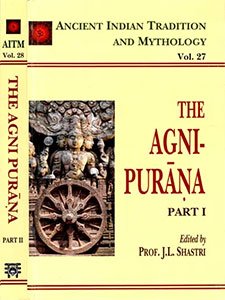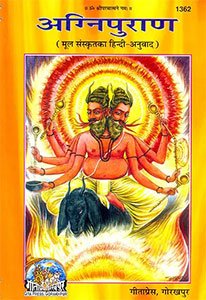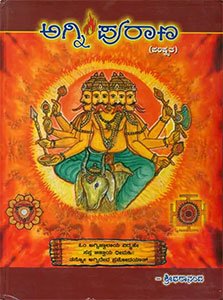Agni Purana [sanskrit]
97,288 words
This Sanskrit edition of the Agnipurana. It is one of the traditional eighteen Mahapuranas presented as an encyclopedia of ancient Indian history and knowledge. It contains either 382 or 383 chapters and over 10.000 verses (Sanskrit Shlokas).
Verse 88.47
दत्वा पूर्णां विधानेन गुणापदानमचरेत् ।
ओं हां आत्मने सर्वज्ञो भव स्वाहा । ओं हां आत्मने परितृप्तो भव स्वाहा । ओं ह्रूं आत्मने अनादिबोधो भव स्वाहा । ओं हौं आत्मने स्वतन्त्रो भव स्वाहा । ओं हौं आत्मन् अलुप्तशक्तिर्भव स्वाहा । ओं हः आत्मने अनन्तशक्तिर्भव स्वाहा ।
इत्थं षड्गुणमात्मानं गृहीत्वा परमाक्षरात् ॥ ४७ ॥
datvā pūrṇāṃ vidhānena guṇāpadānamacaret |
oṃ hāṃ ātmane sarvajño bhava svāhā | oṃ hāṃ ātmane paritṛpto bhava svāhā | oṃ hrūṃ ātmane anādibodho bhava svāhā | oṃ hauṃ ātmane svatantro bhava svāhā | oṃ hauṃ ātman aluptaśaktirbhava svāhā | oṃ haḥ ātmane anantaśaktirbhava svāhā |
itthaṃ ṣaḍguṇamātmānaṃ gṛhītvā paramākṣarāt || 47 ||
The Sanskrit text of Verse 88.47 is contained in the book The Agni Puranam (Anandashram Edition) by Shri Chimna Apate (श्री चिमणा आपटे). This book is available online or you could buy the latest edition:
Read online Buy now! The Sanskrit text by Shri Chimna Apate (श्री चिमणा आपटे) (1987)
Glossary of Sanskrit terms
Note: This extracts Sanskrit terms and links to English definitions from the glossary, based on an experimental segmentation of verse (88.47). Some terms could be superfluous while some might not be mentioned. Click on the word to show English definitions.
Dad, Purna, Vidhana, Guna, Apadana, Atman, Sarvajna, Bhava, Paritripta, Anadi, Anadin, Bodha, Han, Aum, Svatantra, Alupta, Shakti, Anantashakti, Svaha, Ittham, Ittha, Shadguna, Grihitva, Paramakshara,
Analysis of Sanskrit grammar
Note: this is an experimental feature and only shows the first possible analysis of the Sanskrit text (Verse 88.47). If the system was successful in segmenting the sentence, you will see of which words it is made up of, generally consisting of Nouns, Pronouns, Verbs, Participles and Indeclinables. Click on the link to show all possible derivations of the word.
- Line 1: “datvā pūrṇāṃ vidhānena guṇāpadānamacaret ”
- dat -
-
dad (noun, masculine)[compound], [adverb], [nominative single], [vocative single]dad (noun, neuter)[compound], [adverb], [nominative single], [vocative single], [accusative single]dat (noun, masculine)[compound], [adverb]
- vā -
-
vā (indeclinable conjunction)[indeclinable conjunction]vā (noun, feminine)[nominative single]√vā (verb class 1)[imperative active second single]
- pūrṇām -
-
pūrṇā (noun, feminine)[accusative single]√pṝ -> pūrṇā (participle, feminine)[accusative single from √pṝ class 3 verb], [accusative single from √pṝ class 6 verb], [accusative single from √pṝ class 9 verb]
- vidhānena -
-
vidhāna (noun, masculine)[instrumental single]vidhāna (noun, neuter)[instrumental single]
- guṇā -
-
guṇa (noun, masculine)[compound], [vocative single]guṇā (noun, feminine)[nominative single]
- apadānam -
-
apadāna (noun, neuter)[adverb], [nominative single], [accusative single]
- a -
-
a (noun, masculine)[compound], [vocative single]
- caret -
-
√car (verb class 1)[optative active third single]
- Line 2: “oṃ hāṃ ātmane sarvajño bhava svāhā | oṃ hāṃ ātmane paritṛpto bhava svāhā | oṃ hrūṃ ātmane anādibodho bhava svāhā | oṃ hauṃ ātmane svatantro bhava svāhā | oṃ hauṃ ātman aluptaśaktirbhava svāhā | oṃ haḥ ātmane anantaśaktirbhava svāhā ”
- Cannot analyse om*hā
- hām -
-
hā (noun, feminine)[accusative single]
- ātmane -
-
ātman (noun, masculine)[dative single]
- sarvajño* -
-
sarvajña (noun, masculine)[nominative single]
- bhava -
-
bhava (noun, masculine)[compound], [vocative single]bhava (noun, neuter)[compound], [vocative single]√bhū (verb class 1)[imperative active second single]
- svāhā* -
-
- Cannot analyse om*hā
- hām -
-
hā (noun, feminine)[accusative single]
- ātmane -
-
ātman (noun, masculine)[dative single]
- paritṛpto* -
-
paritṛpta (noun, masculine)[nominative single]
- bhava -
-
bhava (noun, masculine)[compound], [vocative single]bhava (noun, neuter)[compound], [vocative single]√bhū (verb class 1)[imperative active second single]
- svāhā* -
-
- Cannot analyse om*hr
- Cannot analyse hrūm*āt
- ātmane -
-
ātman (noun, masculine)[dative single]
- anādi -
-
anādi (indeclinable)[indeclinable]anādi (noun, masculine)[compound], [adverb]anādi (noun, neuter)[compound], [adverb], [nominative single], [vocative single], [accusative single]anādi (noun, feminine)[compound], [adverb]anādin (noun, masculine)[compound], [adverb]anādin (noun, neuter)[compound], [adverb], [nominative single], [vocative single], [accusative single]
- bodho* -
-
bodha (noun, masculine)[nominative single]
- bhava -
-
bhava (noun, masculine)[compound], [vocative single]bhava (noun, neuter)[compound], [vocative single]√bhū (verb class 1)[imperative active second single]
- svāhā* -
-
- Cannot analyse om*ha
- hau -
-
ha (noun, masculine)[compound], [nominative dual], [vocative single], [vocative dual], [accusative dual]ha (noun, neuter)[compound], [vocative single]han (noun, neuter)[compound], [adverb], [nominative single], [vocative single], [accusative single]hā (noun, feminine)[nominative single]han (noun, masculine)[nominative single]√hā (verb class 1)[imperative active second single]
- aum -
-
aum (indeclinable)[indeclinable]
- ātmane -
-
ātman (noun, masculine)[dative single]
- svatantro* -
-
svatantra (noun, masculine)[nominative single]
- bhava -
-
bhava (noun, masculine)[compound], [vocative single]bhava (noun, neuter)[compound], [vocative single]√bhū (verb class 1)[imperative active second single]
- svāhā* -
-
- Cannot analyse om*ha
- hau -
-
ha (noun, masculine)[compound], [nominative dual], [vocative single], [vocative dual], [accusative dual]ha (noun, neuter)[compound], [vocative single]han (noun, neuter)[compound], [adverb], [nominative single], [vocative single], [accusative single]hā (noun, feminine)[nominative single]han (noun, masculine)[nominative single]√hā (verb class 1)[imperative active second single]
- aum -
-
aum (indeclinable)[indeclinable]
- ātman -
-
ātman (noun, masculine)[vocative single]
- alupta -
-
alupta (noun, masculine)[compound], [vocative single]alupta (noun, neuter)[compound], [vocative single]
- śaktir -
-
śakti (noun, feminine)[nominative single]śakti (noun, masculine)[nominative single]
- bhava -
-
bhava (noun, masculine)[compound], [vocative single]bhava (noun, neuter)[compound], [vocative single]√bhū (verb class 1)[imperative active second single]
- svāhā* -
-
- Cannot analyse om*ha
- haḥ -
-
ha (noun, masculine)[nominative single]
- ātmane -
-
ātman (noun, masculine)[dative single]
- anantaśaktir -
-
anantaśakti (noun, masculine)[nominative single]anantaśakti (noun, feminine)[nominative single]
- bhava -
-
bhava (noun, masculine)[compound], [vocative single]bhava (noun, neuter)[compound], [vocative single]√bhū (verb class 1)[imperative active second single]
- svāhā -
-
svāhā (indeclinable)[indeclinable]svāhā (noun, feminine)[nominative single]
- Line 3: “itthaṃ ṣaḍguṇamātmānaṃ gṛhītvā paramākṣarāt ”
- ittham -
-
ittham (indeclinable)[indeclinable]ittha (noun, neuter)[adverb], [nominative single], [accusative single]
- ṣaḍguṇam -
-
ṣaḍguṇa (noun, masculine)[adverb], [accusative single]ṣaḍguṇa (noun, neuter)[adverb], [nominative single], [accusative single]
- ātmānam -
-
ātman (noun, masculine)[accusative single]
- gṛhītvā -
-
gṛhītvā (indeclinable)[indeclinable]√grah -> gṛhītvā (absolutive)[absolutive from √grah]
- paramākṣarāt -
-
paramākṣara (noun, neuter)[adverb], [ablative single]
Other editions:
Also see the following editions of the Sanskrit text or (alternative) English translations of the Verse 88.47
Agni Purana with Hindi Translation
by Tarinish Jha and Dr. Ghanshayam Tripathi (तारिणीश् झा और डॉ. घनश्याम त्रिपाठी) (2007)
Publisher: Hindi Sahitya Sammelan, Allahabad; 1199 pages; Title: अग्निपुराणम् (संस्कृत एवं हिन्दी अनुवाद);
Buy now!
Agni Purana (Two Volumes)
by M. N. Dutt (2023)
Publisher: Parimal Publication Pvt. Ltd.; Editor: K. L. Joshi.; ISBN-10: 8171101690; ISBN-13: 9788171101696; 1070 pages.
Buy now!
Agni-Purana (Set of 4 Volumes)
by N. Gangadharan (2006)
Publisher: Motilal Banarsidass Publishers Pvt. Ltd.; ISBN: Part I 8120803590 (9788120803596); Part II 8120803604 (9788120803602); Part III 8120801741 (9788120801745); Part IV 812080306X (9788120803060); 1271 pages.
Buy now!
The Agni Purana (Hindi)
by (2013)
Publisher: Gita Press, Gorakhpur; Title: अग्निपुराण (केवल हिन्दी अनुवाद); ISBN-10: 8129302934; ISBN-13: 9788129302939; 848 pages.
Buy now!
Agni Purana (Kannada)
by Sreedharananda (2013)
Publisher: Pooja Pusthaka Bhandara, Bangalore; Title: ಅಗ್ನಿ ಪುರಾಣ; 560 pages.
Buy now!Preview of verse 88.47 in Kannada sript:
ದತ್ವಾ ಪೂರ್ಣಾಂ ವಿಧಾನೇನ ಗುಣಾಪದಾನಮಚರೇತ್ ।
ಓಂ ಹಾಂ ಆತ್ಮನೇ ಸರ್ವಜ್ಞೋ ಭವ ಸ್ವಾಹಾ । ಓಂ ಹಾಂ ಆತ್ಮನೇ ಪರಿತೃಪ್ತೋ ಭವ ಸ್ವಾಹಾ । ಓಂ ಹ್ರೂಂ ಆತ್ಮನೇ ಅನಾದಿಬೋಧೋ ಭವ ಸ್ವಾಹಾ । ಓಂ ಹೌಂ ಆತ್ಮನೇ ಸ್ವತನ್ತ್ರೋ ಭವ ಸ್ವಾಹಾ । ಓಂ ಹೌಂ ಆತ್ಮನ್ ಅಲುಪ್ತಶಕ್ತಿರ್ಭವ ಸ್ವಾಹಾ । ಓಂ ಹಃ ಆತ್ಮನೇ ಅನನ್ತಶಕ್ತಿರ್ಭವ ಸ್ವಾಹಾ ।
ಇತ್ಥಂ ಷಡ್ಗುಣಮಾತ್ಮಾನಂ ಗೃಹೀತ್ವಾ ಪರಮಾಕ್ಷರಾತ್ ॥ ೪೭ ॥
![Agni Purana [sanskrit] - book cover](/uploads/a/Agni-Purana-Sanskrit.jpg)
